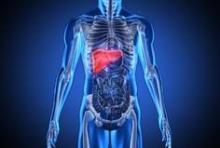Use of statins for any duration of time is associated with a significant reduction in the risk of hepatocellular carcinoma in low-risk populations.
A nested case-control study among 94 cases of hepatocellular carcinoma matched to 468 controls showed a 68% decrease in the risk of hepatocellular carcinoma among patients using statins for less than 2 years and a 69% decrease among patients using them for more than 2 years, compared with nonusers, according to a paper published online Aug. 8 in Cancer Epidemiology (dx.doi.org/10.1016/j.canep.2014.06.009).
The decrease in risk was similar after adjusting for pre-existing medical conditions and hepatocellular carcinoma risk factors, such as type 2 diabetes, hepatitis, hypertension, and alcohol-related conditions.
Katherine A. McGlynn, Ph.D., M.P.H., of the National Cancer Institute and her associates acknowledged that the results may reflect lower prescribing of statins to individuals with liver disease because of concerns about an association between elevated aminotransferase and statin therapy, and said further analysis may help to clarify the issue.
No conflicts of interest were declared.



